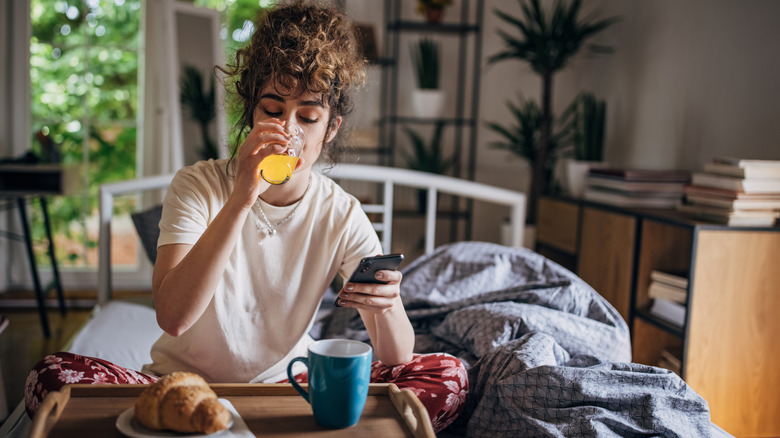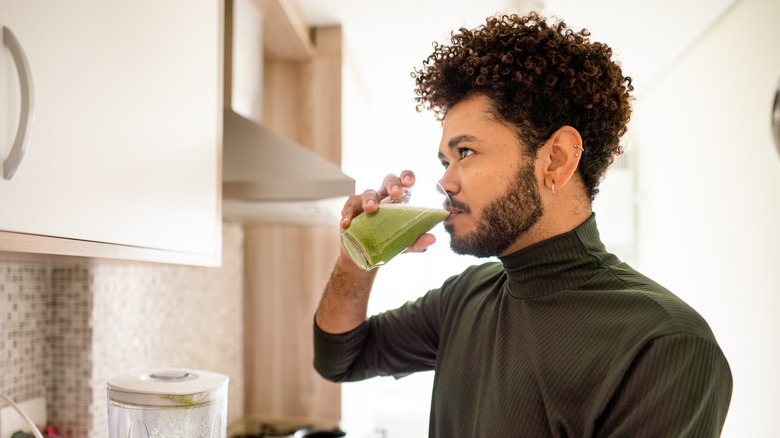Is It Bad To Drink Juice On An Empty Stomach? What To Consider
Most of us might not think much about drinking a tall glass of freshly squeezed orange juice first thing in the morning. In fact, it is not uncommon for this practice to be romanticized and offered as a service at some hotels you stay at when you travel. Even at home, some of us might opt to have it with our meals while others just head straight to the juice carton before putting any food in our bellies. What about those quick early evening or afternoon juice breaks?
There's a danger to the habit of consuming juice on an empty stomach, according to experts. As registered dietitian nutritionist, Blanca Garcia told Eating Well, you could cause your blood sugar levels to rise alarmingly if you consume juice on an empty stomach. "Chronically elevated blood sugar levels can cause health issues and increase the risk of developing diabetes," she noted.
It's true. There's no discounting the fact that properly prepared fruit juices (consumed in moderation) have their share of nutritional benefits but having them at the right time of day can make a big difference to your overall health. When should you be consuming your juices?
The first half of your day might be the best time
Nutritionist, certified diabetes educator, and physiotherapist, Archana Batra told Indian Express that juices are packed full of nutritional value — antioxidants that help with inflammation are one. They can also offer some relief when it comes to constipation and urinary tract infections, she added. Plus, the beauty of juices is that you can combine several different fruits (or vegetables) together and gain from the nutrient profile of each in one tall glass. For most people, it's an easy and efficient way to get some of their nutrients for the day when leading a busy lifestyle.
But when and how you drink juices matter, according to Batra. Limiting juice intake to the morning or early afternoon hours is a good idea, because that is when you might benefit from a boost in energy, offered the nutritionist. Since an empty stomach isn't the best idea, perhaps you can have your glass of juice after breakfast.
Be mindful, however, that consuming your fruits and vegetables in juice form might not offer the same benefits as having them whole. In addition to risking consuming too much sugar (and therefore calories) in one go, you're also compromising the fiber intake offered in whole fruits and vegetables when you juice them to a pulp, per Harvard Health. "Fruit juice also has less fiber and more calories and sugar than whole fruit," explained Batra.
Should you be juicing at all?
There's a difference between juicing diets or focusing mainly on receiving all your nutrients from juices versus making them a part of a balanced diet, shared registered dietician Katherine Zeratsky (via Mayo Clinic).
"Juicing can play a role in a balanced diet. For instance, it can help you get fruits and vegetables if you don't enjoy eating them," offered the dietician. It can also be helpful for those who have underlying digestive health conditions to drink the other nutrients of fruits and vegetables without having to digest fiber, Zeratsky added. If you're looking to up the phytonutrients and fiber profile from combining your favorite healthy fruits or vegetables together, though, try blending instead of juicing (yes, there's a difference), per WebMD. As for fruits you can enjoy, try cranberry juice which is known to protect against urinary tract infections and fight against free radical damage, tomato juice which is high in vitamin C, and beet juice which has a low sugar profile (via Healthline).
If you're short on time and want to get something from the store, opt for something pasteurized, Zeratsky shared. Also, take a look at the nutritional label and look at how much added sugar and other preservatives there are in there. Ultimately, there is such a thing as the best and worst juices for your health, empty stomach or not.



